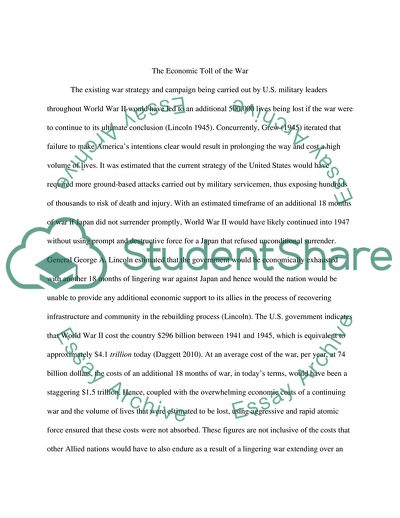Cite this document
(The United States was Justified in the Use of Atomic Bombs on Hiroshima and Nagasaki to End World War II Thesis Example | Topics and Well Written Essays - 2000 words, n.d.)
The United States was Justified in the Use of Atomic Bombs on Hiroshima and Nagasaki to End World War II Thesis Example | Topics and Well Written Essays - 2000 words. https://studentshare.org/history/1820436-the-case-for-the-use-of-the-atomic-bombs-in-japan-to-end-world-war-ii
The United States was Justified in the Use of Atomic Bombs on Hiroshima and Nagasaki to End World War II Thesis Example | Topics and Well Written Essays - 2000 words. https://studentshare.org/history/1820436-the-case-for-the-use-of-the-atomic-bombs-in-japan-to-end-world-war-ii
(The United States Was Justified in the Use of Atomic Bombs on Hiroshima and Nagasaki to End World War II Thesis Example | Topics and Well Written Essays - 2000 Words)
The United States Was Justified in the Use of Atomic Bombs on Hiroshima and Nagasaki to End World War II Thesis Example | Topics and Well Written Essays - 2000 Words. https://studentshare.org/history/1820436-the-case-for-the-use-of-the-atomic-bombs-in-japan-to-end-world-war-ii.
The United States Was Justified in the Use of Atomic Bombs on Hiroshima and Nagasaki to End World War II Thesis Example | Topics and Well Written Essays - 2000 Words. https://studentshare.org/history/1820436-the-case-for-the-use-of-the-atomic-bombs-in-japan-to-end-world-war-ii.
“The United States Was Justified in the Use of Atomic Bombs on Hiroshima and Nagasaki to End World War II Thesis Example | Topics and Well Written Essays - 2000 Words”. https://studentshare.org/history/1820436-the-case-for-the-use-of-the-atomic-bombs-in-japan-to-end-world-war-ii.


